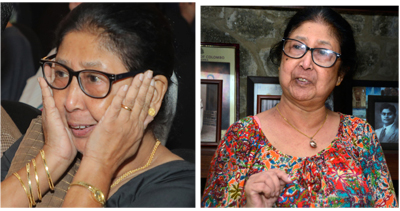English instructor who stumbled on her knack for translation

Manel Eriyagama: The moment her name was announced (left) and (right) at her home in Peradeniya. (Pic by M.D. Nissanka)
Manel Eriyagama was dressed in immaculate Kandyan with Agasthi mala as she stepped into the limelight at the Gratiaen Prize ceremony to receive the coveted H. A.I. Goonetilleke prize for translations from Sinhala or Tamil to English, awarded for the tenth time and always very exacting in standards.
We meet in her Peradeniya home on Wednesday, this charming lady who captivated the audience with her disarmingly frank acceptance speech.
She and her husband live in Eriyagama, he having his roots in the Uda Walawwe, progeny of a Kachcheri Mudliyar, and her own background as an aristocratic Kandyan from the faraway village of Bopitiya.
What led to Jewels – the book of 14 short stories translated from Sinhala that led to Manel winning the H.A.I.?
It was in Bopitiya that Manel fell in love with her elder siblings’ library (they learnt in English while she studied in Sinhala). At school in Mahamaya Vidyalaya where she was a boarder, there was a spacious library that fed her imagination.
Apart from Mahamaya she was at the Ampitiya Convent for a spell, where she learnt English because Sinhala was banned with a fine of 5 cents if so much as a word was spoken (“With two Rupees of pocket money it was a big deal, so we spoke English”).
Manel was always enamoured by Dickens and those tomes like Little Dorrit or Nicholas Nickelby- heavy books which no one else borrowed.
After school she went on to Peradeniya University. She was lucky to be one of those people who have dedicated all their lives to this scenic campus. For 37 years she was an instructor at the English Language Teaching Unit (ELTU).
It was only at the recruitment test for this post that young Manel stumbled upon her knack for translation.
She scored at the test because of her adept handling of a large paragraph to be translated from English to Sinhala where girls who had read English in campus fell short.
The four decades that followed were not very productive in terms of writing and it was only after her retirement that Manel found time to focus on translating.
She wrote four teenage novels and was casting about for inspiration when the idea of translating English books for Sinhala readers occurred.
To her surprise she found that nearly four decades of being at the ELTU had taken its toll and she could not muster enough Sinhala.
“So I thought of doing it the other way.” She translated a collection of Sinhala short stories by Piyaseelie Wijemanne. Just like Piyaseelie’s original book won the State Literary Award in the novel category, the translation won the following year in the translation category. The original Manussa Yanthara was rendered into Human Machines.
Piyaseelie, Manel’s guru in translation, encouraged Manel next to expose herself to other writers, and introduced Manel to writers beyond her horizons and ‘taught me things I’d never known’ in terms of translation.
Letters had to be sent to each of the 14 original writers and “almost everyone responded very enthusiastically”.
Afterwards she also sent the final translation to each writer and there were “no alterations or corrections by them”.
While she is the only literary one in the family her children however helped her with the common everyday words which eluded her while being buried in the task.
Her last resort always was Prof K.N.O. Dharmadasa but “there was one word even he couldn’t decipher”. This was abhimanaya (pride? Not quite) and Manel says she had many such stumbling blocks. For example, there were the words numba, oba, oya tho, thopi etc. which all could only be translated into you- despite having many shades from formal polite to feudal and rude.
Currently, she is engaged in translating Prof. Liyanage Amarakeerti’s Duwana Wattiya Saha Sinasena Tikira, a collection “unlike any I’ve come across”- a challenging feat given the book is subtle and modern.
Today, apart from translating and writing, Manel spends time gardening in her beautiful hilltop garden. Her husband, a former teacher then Director of Administration at the Royal Institute, ‘Appachchi’ as she calls him- stands by her side.
Manel’s daughter lives close by and is a consultant dermatologist and her son is a supply chain manager in Australia.
Searching for an ideal partner? Find your soul mate on Hitad.lk, Sri Lanka's favourite marriage proposals page. With Hitad.lk matrimonial advertisements you have access to thousands of ads from potential suitors who are looking for someone just like you.


